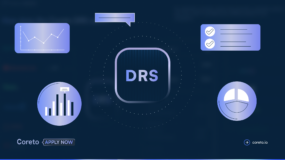
Welcome to the fascinating world of Blockchain and cryptocurrencies! Whether you just want to discover the most discussed topic in the evolution of technology, or you want to make the first transaction with cryptocurrencies, this guide will help you understand why there is so much buzz around the topic.
Let’s start with the beginning!
What is Blockchain technology and why is it revolutionary?
The widespread use of Blockchain technology as a basic platform for modernizing the way data is stored began in 2009. Since then, the potential of Blockchain has not ceased to amaze many teams of developers, financial analysts, and innovators.
A blockchain is a digital log of transactions that is duplicated and disseminated throughout the network of computer systems that make up the Blockchain. Each block on the chain comprises a number of transactions, and whenever a new transaction takes place on the blockchain, a record of it is added to each participant’s ledger.
Blockchain is a sort of distributed ledger technology (DLT) in which transactions are recorded using a hash, which is an immutable cryptographic signature. Blockchain is a method of storing data that uses encryption to make it impossible to modify, hack, or defraud. Blockchains such as Bitcoin and Ethereum are constantly evolving, and as new blocks are added to the chain, the security of the ledger increases. Hackers would have to modify every block in the chain, across all distributed copies of the chain, if they intended to destroy a blockchain system. Imagine how difficult it would be for them to change the information in the thousands of registers that are encrypted…
Blockchain has multiple applications in the real world, being exploited at the highest level in medicine, pharmacy, and supply chain. Did you know that you can follow the exact path of a medicine: where were the raw materials purchased, how was the medicine prepared, how many days was it in storage, and so on?
What are cryptocurrencies?
The whole concept of Bitcoin, the first cryptocurrency, was created as an over-correction of the financial system, but it is still misunderstood by many people. Cryptocurrency is a digital asset and its name comes from cryptography, the method by which all its transactions are encrypted by mathematical methods and quantum encryption to provide security. Unlike traditional currencies, these currencies are decentralized because they are not regulated and controlled by a central authority.
How to choose the best crypto wallet
You’ll need to set up your crypto wallet before deciding which currencies to invest in if you want to go into crypto. This is where you’ll keep track of your cryptocurrency holdings. Each wallet comes with a private key that you — and only you — can use to access the contents.
Public keys work in the same manner that your bank account number does. A public key is a lengthy string of random numbers that may be shared with a third party, such a cryptocurrency exchange, without jeopardizing your wallet’s security. This key enables you to receive cryptocurrencies in transactions—often via a wallet address, which is a compressed form of the wallet’s public key. Private keys, on the other hand, should be kept secret at all times.
To determine if a wallet is right for your needs, you need to look at it from several points of view:
- Security. If you use traditional banking applications, you know that they use a variety of security features to protect your funds and personal information. Most of the time, you have to authorize every transaction you make, for security reasons. Also, every wallet with cryptocurrencies has different methods to ensure that your information is protected, because cyber attacks have become more frequent.
- Fees. Just as in the traditional banking system you pay certain fees for the services used, so you have to pay for the transactions made in the Blockchain. Each transaction in the Blockchain is performed using mining, the method by which computers solve complex algorithms. Transaction fees may vary depending on how fast you want the transaction to be performed, or how congestionate the blockchain is at the time of the transaction.,
- Cryptocurrencies. The number of cryptocurrencies you can collect in a digital wallet may be different. While some let you collect a wide range of digital currencies, others have a narrower selection. This may be due to the fact that some wallets have an extensive coin selection process, and some digital currencies may not meet all validation requirements.
- Customer service. If you need prompt help if you encounter a problem with the digital currencies you have, it is a good idea to find a wallet provider that offers non-stop support. If you are a beginner in cryptocurrencies, you probably already have a few questions in mind that could be clarified by a wallet provider.
- Access. There are a variety of wallets, from those that can be used on the desktop to those that can be used on the mobile. There are even external wallets to increase the security of your digital coin collection. Do some extensive research on this topic and determine which type of wallet suits you best.
The safest way to go is to acquire a hardware wallet also known as cold wallet. Keep those digital assets that you intend to hold for a longer period of time there, and only use a software wallet for those assets that intend to trade in and out on a regular basis.
Why cryptocurrencies are so volatile?
Even though the cryptocurrency market is constantly evolving and gaining popularity among investors and traders, it is still small compared to traditional currencies. This means that small groups of people who own a large number of cryptocurrencies can influence the evolution of trade. As you have heard, the cryptocurrency market is based on speculation. When investors want to make a profit, they bet that the price of a cryptocurrency will decrease or increase, which leads to an influx or a sudden outflow of money from less experienced investors. As a result, volatility increases.
Most cryptocurrencies are purely digital assets and operate according to the principles of supply and demand, but there are no government regulations that prevent volatility.
Fear of Missing Out, known as FOMO, is a pervasive worry that others may be having rewarding experiences from which one is left out. This suggests that individuals are terrified of failing or making the improper option if they lose out on possibilities. FOMO is a powerful force that may generate significant volatility in cryptocurrency markets, but it can also be valuable as more people become informed about blockchain technology and seek methods to participate in these emerging markets.
Investing VS trading: which one is better?
In the financial markets, both traders and investors want to make money, but their approaches to achieving this goal are completely different.
Most of the time, investors want to be able to earn for as long as possible. Because they have a longer time horizon, the expected return on investment is often higher. Traders, on the other hand, are struggling to take advantage of the market turmoil. Usually, they carry out transactions whose profits are small, but perform them in a short time.
Which is the superior option? Which one is the most appropriate for you? It’s up to you to make that decision.
Now that you have some basics to understand the world of cryptocurrencies, we advise you to go through the other tutorials we have made.




